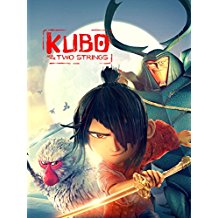 Kubo and the Two Strings, a feature film released in 2016
Kubo and the Two Strings, a feature film released in 2016
I hour, 42 minutes
Produced by Universal Studios, rated PG for thematic elements, scary images, action and peril
I’d heard this anime-style tale praised by some in the industry, so I decided to watch it. My takeaway: for Christian family viewing, don’t let your children watch it without a discussion from you about the various non-Christian elements in the story. For example: identifying ancestor worship as a substitute for knowing and loving the real God.
Kubo’s story is a hero tale, where a boy and two companions–a magical monkey and a human/cockroach–go on a quest to retrieve some charmed armor that is supposed to protect the boy from the awful sorcerer witches who are out to kill him. It doesn’t help that the witches are his aunts, and they’ve just killed his mother. His father vanished when he was very small.
There’s a lot of magicking going on: On the part of the boy (who uses origami magic to tell stories). On the part of the terrifying aunts, who throw bolts of energy around and destroy the village where the boy’s friends live. On the part of his dying mother, who is somehow able to bring the boy’s monkey figurine to life. But not everyone can do magic. The villagers apparently can’t.
There’s ancestor worship. As if they are deities, the ghosts of ancestors appear to loving families in the village, bring peace, give blessing, and then go away. Puzzling to a Christian child, surely.
The quest is for magical armor to protect Kubo from his aunts. On the quest, the nagging monkey and the ditsy cockroach-guy do their committed best to help and protect Kubo, at total risk to their own lives.
SPOILER ALERT
Finally, in a big battle, the two protectors succumb. His evil aunts reveal that the monkey was in fact the spirit of his mother, and the cockroach a transformed version of his father. No wonder the monkey and cockroach were so endearing with Kubo and with each other. But now, with no helpers, what can Kubo do?
The magic armor doesn’t seem to be helping, so he throws it away. Kubo decides to use love instead. He strings his magical banjo with two strings he’d never thought to use before: from bracelets he has made of the hair of each of his loving parents. Behold, the blast of magical force from these two strings dispatches the evil aunts and also the evil grandfather. Love conquers.
Kubo has, by himself, saved the day for him and his village. But he is lonely. Soon the ghosts of his parents appear and seem to comfort him. And then the real person of his grandfather shows up. Instead of an evil monster, he’s now just a forgetful old guy who can’t see very well.
I found this ending puzzling. What is evil according to the writers of this tale? Something that morphs into harmlessness? I know Eastern religions think good and evil are two sides of the same coin, not really different from each other. Perhaps that is the point of this. A good thing to discuss with your kid. Is evil real? How do we know?

My 12yo son wanted to see it with me a few weeks ago. We watched it on Netflix. We discussed the ancestor worship and other things.
One thing we discussed was the observation I made about how the grandfather, the Moon King, was a negative image of God. He tells Kubo that he wants him blind because as long as he holds on to the remaining eye he can never go to the heavens with his true family. In other words, you must be blind to the truth if you want to be with him. You must accept his view of things or you will suffer. Kubo blamed him for the suffering and the parents death particularly, but the grandfather said they disgraced themselves and brought disorder to the world. This is a mirror of the fall and our sinfulness. Kubo did not accept this and said it was just his version of the story.
The Moon King goes on to say that when Kubo goes up he will have infinite life. Again Kubo rejects him and says all stories have an end. Then the grandfather gets angry at his rejection and the battle ensues. Kubo defeats him by holding on to the memories of those he loves who are here or departed. The ancestor worship defeats the vengeful, controlling grandfather, aka God the Father. He is made powerless by it and the villagers proceed to lie to him to create new memories that is supposedly going to make everything better.
The sisters were also sinister portrayals of Christians. They did everything for the sake of their father and in their minds everything was justified because of how the people, particularly Kubo’s mother, had hurt their father. There goal was to take Kubo’s other eye so he could be blinded. Only without sight would he be in his rightful place in the heavens.
To me it was a very stark image of the world’s view of God–controlling, selfish, without love, and without mercy. I was taken back with how blatant it was.